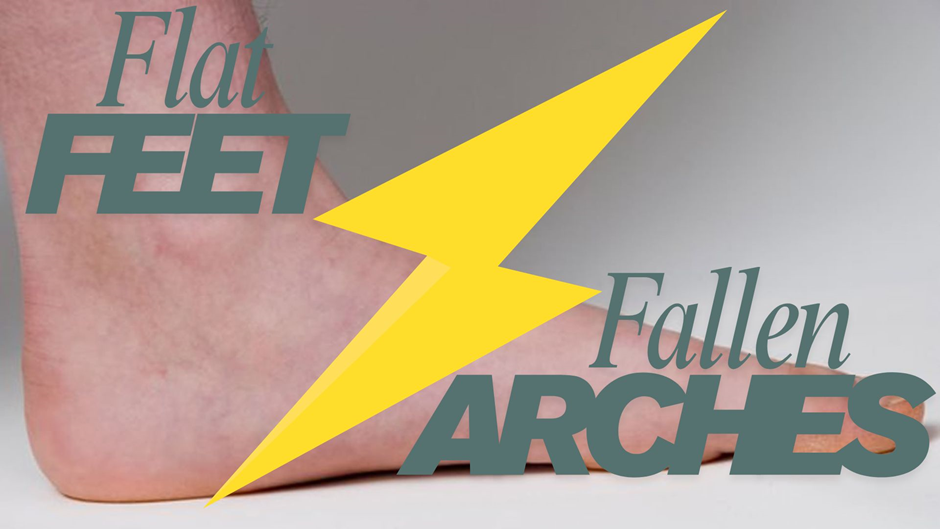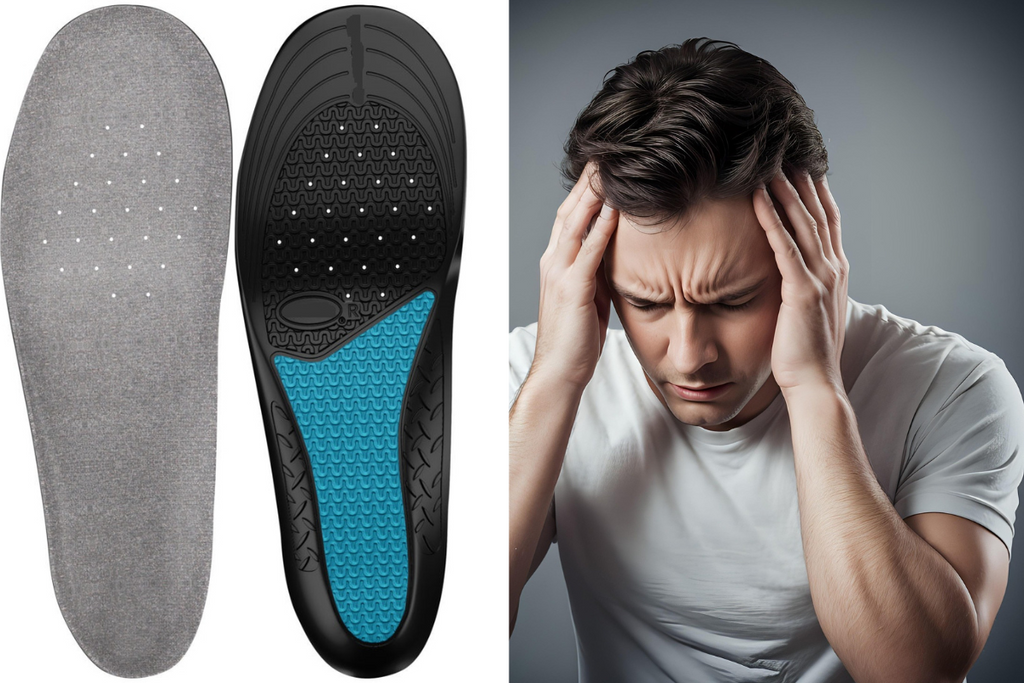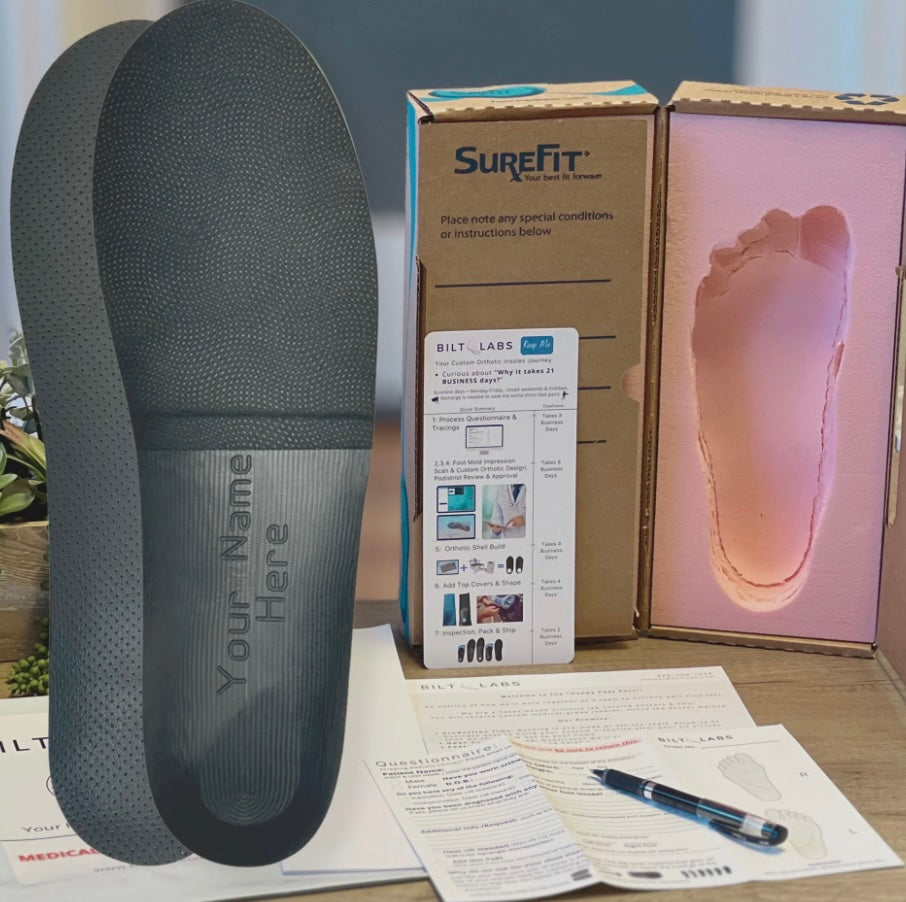Best Custom Orthotics for Plantar Fasciitis: A Comprehensive 2025 Guide
Custom orthotics for plantar fasciitis should be worn by anyone with this painful heel condition. In fact, studies have shown that plantar fasciitis will afflict 10% of all humans at some point in their lifetime.
What is Plantar Fasciitis?
Plantar fasciitis is a condition that results from the inflammation or irritation of the plantar fascia. This is the tissue under the foot that connects the heels to the toes.
With constant use, this tissue begins to show signs of wear and
Signs You Have Plantar Fasciitis
- Pain appears to be worse in the morning and then slowly eases off as the day goes on.
- Worsens when you've been sitting for a long time and then eases off if you move around for a bit. If you stay on your feet for a long while, does the pain and discomfort begin to get worse?
- Feeling of tenderness or pain in the arch or heel
- Increased discomfort when you are on your feet for extended periods or when you are climbing the stairs
While you may not be able to diagnose the condition effectively, knowing these symptoms will come in handy when you talk with your podiatrist.
How Do Orthotics Help with Plantar Fasciitis?
Custom orthotics provide a cushioning effect that helps spread the weight of the body evenly across the foot, helps provide better alignment, as well as arch support.
- Shock Absorption - The right orthotics will absorb the shock of the impact of the body's weight on the foot. In doing so, it automatically reduces the stress on the heels, which is often the first part to hit the ground when you walk.
- Relief from Pain - With the plantar fascia already inflamed or sore, the cushioning effect that the right orthotics will offer will reduce pressure on the tissue, reducing the pain in the process.
-
Better Alignment - Poor alignment will always lead to either overpronation or supination. Either of these will affect the foot's biomechanics, resulting in imbalance and increased pressure on certain parts of the feet. By correcting this alignment issue, balance is
restored and the pressure is spread evenly. - Prevention - Continued use of the right orthotics can ensure proper balance and alignment, preventing an occurrence listed symptoms.
Key Features of a Good Orthotic for Plantar Fasciitis
The major features to look out for when choosing orthotics for plantar fasciitis include:
- Adequate Arch Support - Make sure the contour of the arch support matches your foot shape. This is critical for preventing overstretching in the plantar fascia.
- Heel Cup - The heel cup should be deep enough to provide proper stabilization for the heel. This will also ensure that the fat pad is well-centered, improving shock absorption.
- Fit - Getting the right fit is critical. What you get must fit nicely into your shoes. It doesn't matter if it is a full-length or 3/4 length type.
- Breathability - Choose options that use fabric with moisture-wicking and antimicrobial properties. This will ensure that your feet stay dry and free of bad odor.
-
Durability - You want something made with good quality material. Examples of materials to look for include firm foam or polypropylene. Aside from serving you well, good materials also mean that they will last for
long.
Finally, it also helps to look for products that have the endorsement of organizations like the American Podiatric Medical Association (APMA). You can also ask your podiatrist for recommendations.
Custom vs. Over-the-Counter Plantar Fasciitis Orthotics
Custom orthotics are specially designed and made based on the specific needs of a patient. Assessments are carried out and measurements taken before they are made.
How to Choose the Right Orthotic for You
To get the right orthotics, you need to take the following into consideration:
-
Arch Type – This is an important factor to consider as it will determine how effective your choice will be. You need to find out if you have a high,
medium or low arch type. You can find out your arch type through a simple wet foot test. -
Shoe Compatibility – Obviously, whatever orthotics you choose has to be the right fit for the type of shoe you wear. For dress shoes, you can go for ¾
length while for shoes with removable liners, you can go for the full length type. -
Type and Level of Activity – The type of activity you engage in will determine the type of orthotics you should go for. If you spend a lot of time on your feet, you should be going for thick ones that provide maximum cushioning.
If however you are actively moving or running, then you may be better off with a more flexible type that can also absorb shock efficiently.
After considering all of the above, you should also look for sellers that offer trial periods. This will give you the opportunity to really confirm if your choice is the right one.
Without further wait, here is our list for best orthotics for plantar fasciitis.
Best Overall Orthotic: Stride Soles Custom Orthotics for Plantar Fasciitis
Stride's custom orthotics for plantar fasciitis are German-crafted to fit the specific needs of each patient. It features a high-quality vegan leather top layer, a EVA foam cushioned mid-layer and a base made of durable TPU.
Pros
- Custom-made to address pain points and foot conditions
-
High-quality mater
r ial - 180-Day Money-Back Guarantee
-
Free shipp
p ing - HSA/FSA Eligible
Cons
-
Will take 2 to 3 weeks to be delive
e red - Costs more than most OTC options
Price Range: $137 to $250
Ideal Use Case
This is best for severe cases of plantar fasciitis that have not improved with the use of OTC orthotics.
Best Budget Option: PowerStep Pinnacle Low Arch Insoles
The PowerStep Pinnacle Low insole is full-length orthotic carefully designed for low arch and flat feet. It offers great low arch support and a deep heel cup that efficiently stabilizes the heel while the dual cushioning provided by the EVA foam base and foam top ensures comfortable cushioning.
This insole comes highly recommended by podiatrists and is also approved by the American Podiatric Medical Association (APMA) for the treatment of plantar fasciitis. Given its semi-rigid shell, you get to enjoy a well-balanced mix of stability and flexibility. This feature makes it ideal in a wide range of situations.
Pros
- Balances flexibility with enough rigidity to offer both comfort and stability.
- Great arch and heel support
- Offers dual-layer cushioning for increased comfort and durability
-
Feature
a heat, friction and perspiration reducing top fabric for an odor-free experience - Will easily fit most shoes with removable insoles
Cons
-
May need
a short break in period - Not ideal for persons with high arch
Price Range: $40 - $50
Ideal Use Case
It can be used as an everyday wear for folks with flat feet or mild to moderate cases of plantar fasciitis. It should be worn with casual shoes and work boots.
Best for Runners: Superfeet All-Purpose Support Low Arch Insoles
This low arch insole is designed to offer support for a wide range of use cases. Made specifically for low arch support, runners will enjoy the stability and shock absorption it offers. It's quite lightweight and flexible, with a deep heel cup and high-density foam that improves stability and shock absorption. With its thin profile, it will fit nicely in tight-fitting footwear, even some without removable insoles.
Pros
- Lightweight and flexible, making it ideal for runners
- Good shock absorption and stability
- Can be trimmed to fit a wide range of users
- Will fit in tight-fitting footwear
- Offers odor control for reduced foot odor
Cons
- The thin profile will not be suitable for extended periods of standing
- Cost more than the average over-the-counter orthotics
Price Range: $50 - $60
Ideal Use Case
It’s best for runners or athletes with low arch who want supportive orthotics that are lightweight and can easily fit into their athletic shoes.
Best Legacy Custom Orthotic Brand: Upstep
This orthotics is completely tailored to your needs. Following a process of assessment that you will complete entirely from the comfort of your home, professional podiatrists design the exact solution that your feet require. You will end up getting orthotics that will offer a complete solution to any underlying issues.
Pros
- 180-day full money-back guarantee
- Free shipping
-
Complete home proces
s s -
Custom fit for any arch type and foot conditio
o n - FSA/HSA Eligible
Conn s
-
Cost way more than OTC option
n s - It can take over two weeks to get to you
Price Range: $150 - $250
Ideal Use Case
This is best for patients with serious cases of plantar fasciitis, requiring custom-made solutions.
Best for Everyday Use: Tread Labs Pace Insoles
Tread Labs Pace Insoles are designed to alleviate the pain and discomfort of those suffering from plantar fasciitis. They are also helpful for people with severe overpronation. Combining an extra firm medical-grade support with support for four arch types (low, mid, high, extra high) and a deep heel cup, these insoles increase shock absorptivity and balance. The result of all of these is less pain and discomfort.
Prr os
-
Semi-custom with support for medium, high and extra high arch typ
p es -
Extra firm medical-grade suppo
o rt -
Two-part system with a replaceable
t op - A million-mile guarantee
- APMA approved
Coo ns
-
More expensive than many OTC insol
l es - The extra firm medical-grade support may need some getting used to
Price Range:
Ideal Use Casease
It’s ideal for a wide range of every day uses including walking, hiking, and running. Anyone dealing with over-pronation or supination issues can use it.




